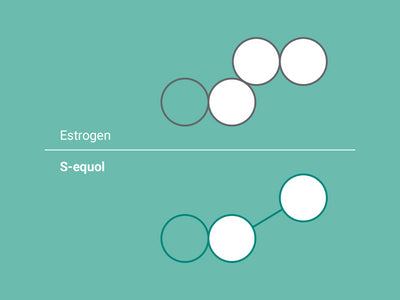
Vitamin Deficiencies During Menopause & How To Safely Address Them
Nutrient deficiencies can happen throughout life, but the chances of developing one can increase with age and especially during menopause. Menopause supplements can aim to support bodily functions during this time where women may experience nutrient gaps. Nutrient gaps can occur during the menopause transition for various reasons, including age, lifestyle, digestive health, and the impact of lower estrogen levels on the host of bodily functions this hormone supports. For example, calcium needs increase for women after menopause for two reasons, both of which are associated with the decreased estrogen production that comes with menopause.1 Often, women over age 51 are also less likely to absorb vitamin B12 from its natural food sources.2 Thankfully, you can give your body the nutritional support it needs during menopause by eating delicious foods and supplementing with the nutrients you may be deficient in!
4 KEY MENOPAUSE NUTRIENTS
As our bodies change with time, so too do the ways our bodies respond to the nutrients we provide them with. This is completely natural, and our needs change over time, like with anything else. If you’re looking for a few new nutrient ideas for your next snack or meal, here are 4 key menopause nutrients which are especially affected by estrogen loss.
Make the most out of your magnesium intake
Magnesium doesn’t make it onto a lot of lists about nutrients during menopause, but it should. This mineral plays an important role in over 300 biological reactions in the body, but specifically in bone health and energy metabolism. Energy metabolism is how the body generates energy from the nutrients found in our food. The latest public health nutrition data shows that approximately 60–70% of the US population falls short of their recommended magnesium intake.1
Not getting enough magnesium can affect your calcium levels as well as increase your risk for hypertensive vascular disease, as well as osteoporosis.1 Research has also shown for years that magnesium plays essential roles in the body’s sleep-wake cycles.3 A recent study found that 59% of adults who reported short sleep (fewer than 7 hours) also weren’t consuming enough magnesium in their diet.4 While we don’t yet fully understand the connection between this nutrient and sleep, it’s clear magnesium is important for sleep health.
The Institute of Medicine recommends women consume 320 mg daily of magnesium. Thankfully, magnesium can be found in many foods, including:1,5
- Brown rice
- Cashews
- Spinach
- Almonds
- Avocados
- Peanuts
Be on the lookout for vitamin B12
Vegans and vegetarians are probably already aware of their need for this crucial vitamin, which is found primarily in animal byproducts. Whether or not you regularly eat meat and dairy products, after age 50 it becomes more difficult for your body to absorb vitamin B12 from its common sources.6 Vitamin B12 deficiency symptoms can include everything from numbness and tingling in the hands or feet to difficulty walking or even dementia.7 Other symptoms include appetite loss and anemia. As such, it’s important to seek out ways of getting enough of this nutrient during menopause as well.
It’s recommended women consume 2.4 mcg. Vitamin B12 is mostly found in animal byproducts, such as:7
- Crab
- Beef
- Salmon
- Milk
- Brie
- Egg
- Chicken
Because vitamin B12 is mostly found in animal byproducts, women who don’t regularly consume those types of food might want to consider supplementation to ensure they’re getting enough of this vital vitamin during menopause and beyond.
Calcium can keep your bone health going strong
Calcium is a key player in bone health during every stage of life, but especially so as your body adjusts to life with lower estrogen levels. Calcium needs for women actually increase after menopause.1 Calcium deficiencies can accelerate bone loss and ultimately lead to osteoporosis.8 Low calcium levels can also affect your kidneys, vitamin D levels, and in some cases, even affect your magnesium levels.8
If you can eat dairy products, you can generally get most of your calcium requirements from your diet. Dairy products which contain calcium include:8
- Yogurt
- Milk
- Cheddar cheese
If you don’t or can’t eat dairy, other sources of calcium are:8
- Salmon
- Tofu
- Broccoli
- Bok Choy
- Dried figs
- Oranges
- Kale
- Many fortified juices
Vitamin D supports both bone health and calcium
Vitamin D is also essential for bone health and helps calcium absorption.1 A vitamin D deficiency can increase your risk for osteoporosis and negatively impact how well your body absorbs calcium, as well as negatively affect your immune system.9
Vitamin D deficiencies are quite common among all ages, for a variety of reasons. For one, vitamin D isn’t easily found in food. The best source of this vitamin comes from 10-15 minutes of sun exposure every few days without sunscreen. Sunscreen and clothing (all those responsible ways of being in the sun) can actually block how well your body synthesizes vitamin D and increase your risk for a deficiency. Vitamin D can also be found in fortified dairy products, fatty fish, and some mushrooms.1
It’s recommended women under 70 get 15 mcg (600 IU) per day, which increases to 20 mcg (800 IU) per day once you reach age 70.1
6 Game-Changing Nutrients For Your Changing Body
NUTRITION AND MENOPAUSE
Taking care of your health during and after menopause shouldn’t feel like yet another thing to add to your to-do list. It should feel like a great life hack—a way to make everything else in your life slightly more manageable. As you continue on this path during and after menopause, keep an eye on your magnesium, vitamin B12, calcium, and vitamin D intake. Aim for a diverse, plant-based diet. Find the fruits and vegetables that make your tastebuds sing and experiment with new recipes to try them in. And remember, every small good choice still deserves to be celebrated.
References
- Shifren, Jan et al. The North American Menopause Society Recommendations for Clinical Care of Midlife Women. Menopause: The Journal of The North American Menopause Society. 204; 21(10). http://www.menopause.org/docs/default-source/2014/nams-recomm-for-clinical-care
- O’Connor et al. Canadian Consensus on Female Nutrition: Adolescence, Reproduction, Menopause, and Beyond. Journal of Obstetrics and Gynaecology Canada. 2016; 38(6): 508 - 554. https://www.jogc.com/article/S1701-2163(16)00042-6/fulltext
- Feeney, K.A. et al. Daily magnesium fluxes regulate cellular timekeeping and energy balance. 2016; 532:375–379.
- Ikonte, CJ et al. Micronutrient Inadequacy in Short Sleep: Analysis of the NHANES 2005–2016. Nutrients 2019; 11 (10): https://www.mdpi.com/2072-6643/11/10/2335
- Oregon State University. “Magnesium.” 2019. Linus Pauling Institute, Micronutrient Information Center. Accessed on: September 28, 2020. https://lpi.oregonstate.edu/mic/minerals/magnesium
- Stover, Patrick J. “Vitamin B12 and older adults.” Current opinion in clinical nutrition and metabolic care 13,1 (2010): 24-7. https://www.ncbi.nlm.nih.gov/pmc/articles/PMC5130103/
- Oregon State University. “Vitamin B12.” 2014. Linus Pauling Institute, Micronutrient Information Center. Accessed on: September 28, 2020. https://lpi.oregonstate.edu/mic/vitamins/vitamin-B12
- Oregon State University. “Calcium.” 2017. Linus Pauling Institute, Micronutrient Information Center. Accessed on: September 28, 2020. https://lpi.oregonstate.edu/mic/minerals/calcium
- Oregon State University. “Vitamin D.” 2017. Linus Pauling Institute, Micronutrient Information Center. Accessed on: September 28, 2020. https://lpi.oregonstate.edu/mic/vitamins/vitamin-D


